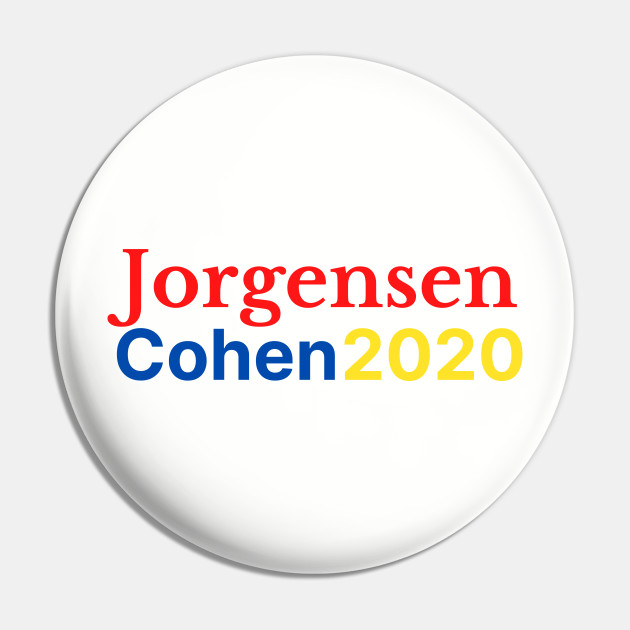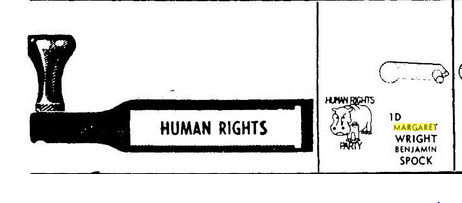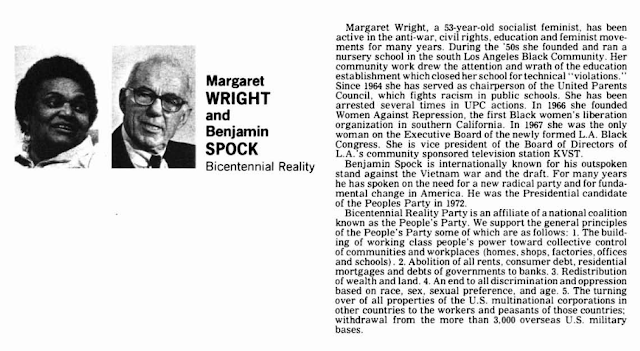Jeremy Cohen, June 28, 1982 (Baltimore, Md.) -
VP candidate for Libertarian Party (aka Independent) (2020)
Running mate with nominee: Joanne Marie Jorgensen (b. 1957)
Popular vote: 1,865,724 (1.18%)
Electoral vote: 0/538
The campaign:
Jeremy "Spike" Cohen was a protégé of perennial performance artist candidate Vermin Supreme. Unlike the mainstream two parties, Libertarian candidates frequently name their selection for Vice-President well ahead of the nomination process. Vermin's choice was Spike Cohen.
Cohen had written on Supreme's website--
My name is Spike Cohen, and I’m running for the Libertarian nomination for Vice President. My beliefs lines up solidly with the Libertarian Party Platform, with the only exceptions being when I think it doesn’t go quite far enough in promoting maximum freedom. I understand that the Platform is an attempt to compromise between different positions and I completely respect that, but as an individual candidate my policy is anarchy.
With that said, I realize as that as Vice President I will not be able to simply snap my fingers and make government go away. For that reason, I am willing and eager to compromise as hard as I absolutely need to in order to change government from the inside. As we all know, compromising on principle with sociopaths who want to enslave the world is a surefire way to achieve positive change.
To that end, I am unleashing my Verbal Agreement For An Even Better America, which builds upon Vermin’s 4 Point Platform of Free Ponies, Mandatory Tooth Brushing, Zombie Power and Killing Baby Hitler to create the greatest world any of us could possibly imagine.
I pledge that all of these things will happen in the first 100 days of our administration, or else I will resign and be replaced with Baby Yoda:
Early in his campaign with Supreme, Cohen told one reporter, "We've been accused of doing this as some kind of satirical campaign. That we're trying to shed light on the fact that that this entire system is a joke. This is a ridiculous accusation. I reject it entirely. We're of course perfectly serious about our entire platform ... The chips are stacked against us from the president down to the congress to most major media ... It's the system that's a joke and it treats us as a joke and it treats the idea of having more than two options as a joke. We're changing the punch line by trolling the system."
Although Supreme's quest for the nomination was not a success (he finished in third place), Cohen narrowly won the VP nod on the third ballot by defeating John Monds. The latter was the first choice of Presidential nominee Jo Jorgensen. She had been the 1996 Libertarian running-mate and the first woman to run for President under the Party's banner.
The selection of Cohen for the second spot drew some negative reaction from certain politicos. The New York Intelligencer ran an article entitled, "Libertarians Decide to Become a Joke in 2020" by Ed Kilgore, including the following--
But the effort to make the Libertarian Party a viable option without celebrity leadership will perhaps be tested the most by Cohen’s presence on the national ticket. He appears to have completely internalized Supreme’s troll-ish approach to politics, as indicated in an interview earlier this year:
“It’s the system that’s a joke and it treats us as a joke and it treats the idea of having more than two options as a joke.” he explained. “We’re changing the punch line by trolling the system.”
And so, when running for the veep nomination, Cohen trumped Supreme’s free-pony promise (politicians promise people everything, you see) with an extra offer of free cheesy bread and Waffle Houses on every corner. He also added to Supreme’s long-standing pledge to fund time-travel research and then go back to kill Baby Adolf Hitler with a pledge to kill Baby Woodrow Wilson, too.
Let’s just stipulate that Spike Cohen, like Vermin Supreme, is at best an acquired taste. Aside from all the aggressive trolling, he self-identifies as an anarchist. On the positive side, from a seriousness point of view, he does not wear a boot on his head.
However from what I observed, Cohen rose to the occasion after his VP nomination and waged a relatively serious campaign clearly articulating the Libertarian positions in a professional manner. He was even occasionally seen wearing a necktie. He did travel on a bus tour late in the campaign, but due to COVID-19 it seems many of his public appearances were online with podcasters.
Jorgensen's final popular vote tally was the highest of any female third party Presidential candidate in U.S. history. The Libertarian ticket, as usual saw their strongest results in the West: South Dakota (2.63%), North Dakota (2.60%), Utah (2.58%), Montana (2.53%), Alaska (2.47%), Kansas (2.23%), Nebraska (2.12%), and Wyoming (2.08%). They finished with over 1% and just under in more than 30 additional states.
The 2020 results ended with the second highest number of popular votes and percentage (after 2016) in the history of the Party. It was only the third time the Libertarian Presidential candidate cracked 1% nationally and likewise for exceeding a million votes.
If one accepts the debatable premise the Libertarians were spoilers who hurt Trump and helped Biden, then Jorgensen/Cohen would possibly have made a difference in favor of the Democrats in Georgia, Arizona, and Wisconsin. But even so, Trump winning all three would still have put him under the 270 Electoral votes needed to win.
Since both Libertarian candidates were residents of South Carolina there would have been a potential legal snag in the event of their victory per the Constitution.
Election history: none
Other occupations: web designer, podcaster
Notes:
One of Cohen's final stops on his bus tour was in Olympia, Wash. on the Capitol Campus on the site of the original Governor's house, in fact. His rally was held across the street from the old Thurston County Courthouse, where I registered to vote the day I turned 18 back in 19[*cough!* *cough!*] not long after 18 year olds were granted the right to vote. Wish I had known he was appearing here, I would have attended for pure academic interest.
Washington State trivia alert about that courthouse regarding third party Presidential candidate and also VP candidate (with Eugene McCarthy) Dick Gregory-- Dick Gregory was a ground-breaking African American comedian who became better known as a political activist than as an entertainer. I first became aware of Gregory in the 1960s when he protested in favor of the Nisqually Indians treaty fishing rights. For his trouble he was tossed into the Thurston County jail in Olympia, Washington where he engaged in a fast. In those days the jail was in the old courthouse across the street from the Capitol campus. The Nisqually people had set up a camp across the street on the Cap campus lawn in a show of support for Gregory. Talking with them was a political education for me and left a deep impression, so in that sense Gregory was successful in communicating his message to at least one individual.
















































